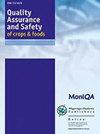蚕豆粗肽提取物对半干米粉货架期的抗菌活性
IF 5.3
3区 农林科学
Q1 FOOD SCIENCE & TECHNOLOGY
引用次数: 11
摘要
本研究为Lablab bean (CPL)粗肽提取的新天然来源提供了应用前景。在米粉工业中使用苯甲酸盐等添加剂是一种常见的做法,对质量和保质期有几个好处effects。与其他添加剂相比,粗肽提取物可延长半干米粉的保质期,且质量可接受。本研究旨在提取CPL并测定其effect对微生物生长的影响。比较了CPL与壳聚糖、百里香酚、苯甲酸等天然提取物对半干米粉保质期的影响。CPL样品用5%胃蛋白酶提取,孵育24 h,浓度为200 mg/mL的CPL可作为蜡样芽孢杆菌的生长抑制剂,但不能作为金黄色葡萄球菌和大肠杆菌的生长抑制剂。结果表明,添加CPL的面条具有最高的蒸煮损失(4.69)和最低的抗拉强度(22.6 g.force)。总体喜欢度得分略为喜欢(6.0分/ 9分),68%的消费者接受了经过cpll处理的面条。保质期测试表明,CPL可使面条的保质期比对照(1天)延长3天。添加200 mg/mL CPL可使面条的保质期比对照(无添加剂)延长3倍以上。CPL与苯甲酸接近effective,可保存3天。加CPL的面条在总体喜欢度上的快乐得分为略喜欢(6.2)。本研究表明,添加CPL可以作为一种新的天然添加剂,在面食、香肠等食品中应用前景广阔。本文章由计算机程序翻译,如有差异,请以英文原文为准。
Antimicrobial activity of a crude peptide extract from lablab bean (Dolichos lablab) for semi-dried rice noodles shelf-life
This study provides an application of new, natural source of crude peptide extract from Lablab bean (CPL). Use of additive such as benzoate in the rice noodle industry is a common practice and has several beneficial effects on quality and shelf-life. However, the shelf-life of semi-dried rice noodles can be extended by crude peptide extract with acceptable quality when compared to other additives. This research aimed to extract CPL and determine its effect on the growth of microorganisms. The use of the CPL to extend the shelf-life of semi-dried rice noodles was compared with other natural extracts (chitosan and thymol) and benzoic acid. The CPL samples were extracted using 5% pepsin and incubated for up to 24 h. CPL at 200 mg/mL could be used as the growth inhibitor for Bacillus cereus but not for Staphylococcus aureus and Escherichia coli. It was found that noodles with CPL had the highest cooking loss (4.69) and lowest tensile strength (22.6 g.force). Overall-liking scores showed slightly liked (6.0 out of 9) and 68% of the consumers accepted the CPL-treated noodles. Shelf-life testing showed that CPL could extend the shelf-life of the noodles for 3 days than the control (1 day). Using 200 mg/mL of CPL could extend the shelf-life more than 3 times when compared to the control noodle (no additive). The CPL was nearly as effective as benzoic acid that could be kept for 3 days. Hedonic score in overall-liking showed a slightly like (6.2) for the noodles with CPL. This study suggests the application of adding CPL could be used as new natural additive and seems to be promising to apply in many food products such as pasta or sausages.
求助全文
通过发布文献求助,成功后即可免费获取论文全文。
去求助
来源期刊

Quality Assurance and Safety of Crops & Foods
FOOD SCIENCE & TECHNOLOGY-
CiteScore
4.60
自引率
7.50%
发文量
61
审稿时长
1 months
期刊介绍:
''Quality Assurance and Safety of Crops & Foods'' is an international peer-reviewed journal publishing research and review papers associated with the quality and safety of food and food sources including cereals, grains, oilseeds, fruits, root crops and animal sources. It targets both primary materials and their conversion to human foods. There is a strong focus on the development and application of new analytical tools and their potential for quality assessment, assurance, control and safety. The scope includes issues of risk assessment, traceability, authenticity, food security and socio-economic impacts. Manuscripts presenting novel data and information that are likely to significantly contribute to scientific knowledge in areas of food quality and safety will be considered.
''Quality Assurance and Safety of Crops & Foods'' provides a forum for all those working in the specialist field of food quality and safety to report on the progress and outcomes of their research.
 求助内容:
求助内容: 应助结果提醒方式:
应助结果提醒方式:


